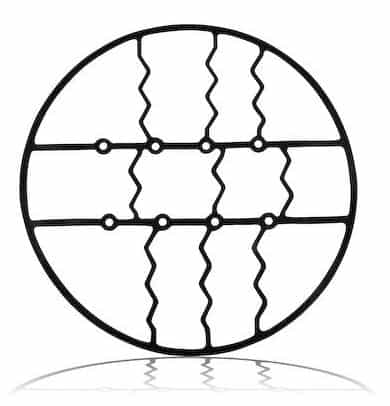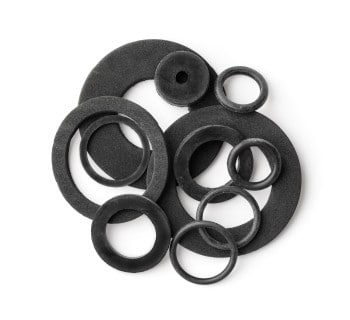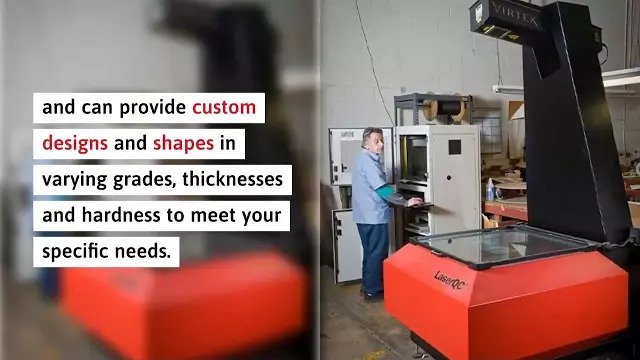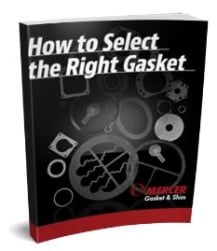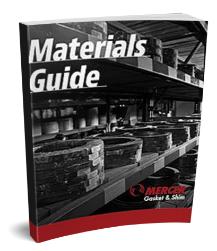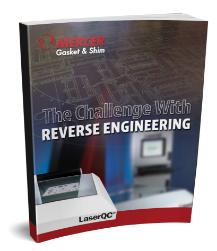Rubber Gaskets | Rubber Material Types
Mercer Gasket & Shim fabricates superior custom rubber gaskets that can be die cut or CNC flash cut from a variety of rubber materials.
Rubber gaskets play a role in applications spanning a variety of industries. While most rubber gaskets are similar in function, they are not universal. The specific rubber material and gasket style may vary widely depending on the application.
At Mercer Gasket & Shim, we feature an expansive product line of gaskets to ensure we have a solution for any application. This page will focus on rubber gaskets, how they are made, what they are used for, and how to select the best material for a specific use case.
Custom Die Cut and Flash Cut Rubber Gaskets
- Die-cut rubber gaskets provide a cost-effective solution for production runs of all sizes. With this fabrication method, a die punches the shape of the rubber gasket out of a sheet of rubber material. The dies used to create die-cut rubber gaskets are highly customizable, so this type of gasket is typically tailored specifically to its intended use case.
- Flash cutting is another production method used to create rubber gaskets. Flash cutting is typically performed using an automated CNC machine with a stationary blade to cut gaskets from stock material. Flash cutting is fast, customizable, has a lower upfront cost, and works well for simple designs, prototypes, and small production runs.
Advantages of Rubber Gaskets
Rubber gaskets present advantages in numerous applications. They help prevent leaks and loss of pressure in countless forms of process equipment, piping systems, machinery, and more. At Mercer Gasket, our rubber gaskets offer advantages such as:
- Customizability
- Availability in a variety of colors
- A broad selection of materials
- Targeted resistances
Industrial Applications
Typically used in piping and plumbing applications, our rubber gaskets offer excellent resilience and sealing for applications involving low temperatures and pressures and mild chemical environments.
Some of the most popular industrial applications for our rubber gaskets include:
- Piping and plumbing
- Chemical processing
- Oil and gas
- Water and wastewater management
Choosing the Best Rubber Material for Your Gasket Application
At Mercer Gasket & Shim, we offer an exceptional range of materials to choose from. This enables our customers to order gaskets that meet the specific challenges of their operations. Most rubber, whether natural or synthetic, is also available in sponge form (cellular rubber) in both open and closed cell grades.
Our highly knowledgeable team of engineers can guide you through the process of selecting the ideal rubber/PVC material for your unique gasket applications:
- Butyl – A copolymer of isoprene of isobutylene, butyl is a synthetic rubber with several distinctive benefits. Butyl is impermeable to moisture and various gases, making it an ideal choice for airtight applications. With a service temperature range of -40°F to 225°F, this material has exceptional resistance to chemicals, abrasion, and diverse weather conditions. Butyl can easily adhere to other rubber materials, and it has great electrical insulation properties.
- Ethylene Propylene Diene Monomer (EPDM) – Ethylene propylene diene monomer, commonly known as EPDM, is an elastomer known for its high durability and versatility. EPDM has excellent resistance to heat, ozone, oxygen and oxygenated solvents, chemicals, animal and vegetable oils, and harsh weather. Stable in low and high temperatures, this material has a service range of -40°F to 250°F and is intermittent to 275°F. Additionally, EPDM can resist polar and steam substances with great proficiency.
- Natural (Pure Gum) Rubber – Natural rubber is a polymer consisting of isoprene. This soft material has high elasticity, which provides superior physical properties such as resistance to abrasion and low temperatures. Ideal for applications requiring acids, organic salts, and other chemicals, natural rubber is non-toxic and has a temperature range of -20°F to 170°F.
- Neoprene – Neoprene is a synthetic rubber created by polymerizing chloroprene material. Also called polychloroprene, neoprene is a flame-retardant material that can also resist the effects of oils, chemicals, oxygen, and ozone. For applications requiring higher tensile strength and ease of movement, cloth inserted neoprene is available; each variation can operate within the same -20°F to 170°F temperature range.
- Nitrile (NBR, Buna-N) – Nitrile is a copolymer of butadiene and acrylonitrile. This synthetic rubber material is resistant to various solvents, hydraulic fluids, animal and vegetable oils, and aromatic fuels; nitrile can also diminish the effects of heat aging. Nitrile performs optimally in temperatures ranging from -25°F to 170°F, and it is available in premium, commercial, and FDA grades.
- Styrene-butadiene rubber (SBR) – Styrene-butadiene rubber (SBR) has similar properties to natural rubber, but is more resistant to abrasion, wear, and hot and cold water. SBR has excellent adhesion to metals, and is available in red rubber and cloth inserted varieties; the latter is more proficient at handling movement, high compression loads, and saturated and low pressure steam. Each SBR variation can operate within the same -20°F to 170°F temperature range.
- Silicone – An extremely soft and adaptable material, silicone is composed of polymerized siloxanes. Silicone boasts superior elastomeric properties at both high and low temperatures and is resistant to the effects of ozone, oxygen, aging, ultraviolet (UV) light, and extreme weather conditions. Available in FDA grade, this material was a wide temperature service range of -67°F to 400°F and is intermittent to 450°F.
- Vinyl – Polyvinyl chloride (PVC) is a synthetic plastic polymer commonly used in applications with water or oxidizing agents. PVC material offers excellent resistance to abrasion and weather, and is available in rigid or flexible forms to suit various application needs. This material is ideal for temperatures ranging from 20°F to 160°F.
- Viton® – Known for its outstanding resistance to chemical substances, Viton® is a fluorocarbon-based synthetic rubber. This material can perform optimally in the most extreme conditions—Viton® has a maximum operating temperature from 400°F (continuous) to 500°F (intermittent). Additionally, this material can repel oxygen, ozone, various fuels and oils, solvents, and hydraulic fluids.
Most rubber, whether natural and synthetic, is also available in sponge form (cellular rubber) in both open and closed cell grades. Mercer offers neoprene, nitrile, silicone and Viton in sponge form. Closed cell sponge is available for applications requiring high compressibility, while open cell is available for cushioning applications where sealing is not an issue.
Quality Custom Rubber Gaskets From Mercer Gasket & Shim
Using material sourced from domestic rubber manufacturers, Mercer Gasket & Shim keeps a large quantity of rubber materials in stock and can provide custom designs and shapes in varying grades, thicknesses and hardness to meet your specific needs.
Our team is committed to helping clients pinpoint ideal solutions to unique hurdles in their applications. If you’d like to learn more about our capabilities, contact us today or request a quote.
For additional information, please download our Rubber Gaskets Information Data Sheet and check out our Materials Guide to find out about which rubber gasket product may be best for you.
Our Capabilities
Knife Cutting
Mercer Gasket & Shim’s highly accurate, state-of-the-art knife cutting capabilities allow us to deliver products to customers when speed, flexibility, and convenience are important.
Learn More Laser CuttingLaser Cutting
Specializing in fast turnaround of thin-gauge components, Mercer Gasket & Shim offers world-class laser cutting services for applications where precision is a high priority and quality is essential.
Learn More Waterjet CuttingWaterjet Cutting
Mercer Gasket & Shim’s waterjet cutting service offers a fast, flexible, and accurate method for fabricating complex or difficult parts while maintaining the integrity of the material.
Learn More Flatbed Die CuttingFlatbed Die Cutting
Our high-speed, Flatbed die-cutting can be used to create a variety of components, such as gaskets, packaging, bumpers, dampeners, labels, printed products, and more.
Learn More CNC Router CuttingCNC Router Cutting
Mercer Gasket & Shim is equipped with new, state-of-the-art router cutting equipment. We can assist with mid to high volume mass production runs.
Learn More
